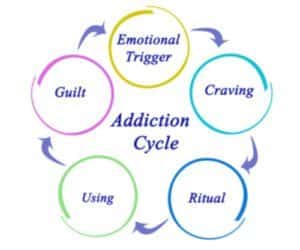How to Understand and Deal with Triggers

We all have to learn how to handle triggers when they occur. Something we see or an event that happens will spark a reaction in us that might not always be suitable to the situation. But we will try and justify our reaction by attempting to rationalize why we are right in dealing with the trigger in the way that we chose to. Reactions to triggers are usually created from past experiences and we tend to keep repeating the same reactions that we had in the past.
People addicted to drugs or alcohol will immediately be compelled to take a drink or do drugs when they experience a trigger. Past negative behavior will be repeated until the addict learns how to effectively handle triggers and reactions. Anyone who has a negative response to a trigger should try to think and behave in an opposite, healthy way than they did in the past. There are ways to handle triggers effectively and avoid negative responses.
Emotional triggers often evoke strong feelings and intense reactions. These types of triggers often activate the “fight or flight” response in people when they feel threatened in some way. Emotions can motivate us to action and they can help us communicate more effectively with other people. Emotions can be activated by external events and/or internal dialogue with your self. Some very strong emotions are: love, fear, shame, sadness, pride, anger, despair and happiness. We should try to become aware of our emotions and how we physically and mentally react to them. When someone is angry about something their body will start to tense up and feel hot. A person’s heart will start to beat faster when they feel scared, and relax when they are happy.
We all experience triggers from other people, events, thoughts and emotions. Everyone has their own unique set of triggers and we each need to learn what ours are. Some triggers for addicts are: seeing someone who is high on drugs or drunk on alcohol, passing by or going inside a bar, having an argument with someone, payday, being bored or lonely. Learn what your triggers are and have a plan ready to use whenever you encounter one. Being prepared ahead of time allows you to use the best response to triggers. Keep your trigger plan handy and review it often, and you will never be unprepared to deal with triggers, cravings or temptations.
Start to take good care of yourself by eating nutritious meals, hydrating with plenty of water, exercising and getting enough rest. This will keep you physically and mentally strong to handle anything that may come your way. If you allow yourself to become weak or sick, you will be more vulnerable to triggers, cravings and temptations.
If you find that you are having strong emotional thoughts that are upsetting, you should talk to your therapist or counselor. Working through difficult emotions is a process and requires time, so be patient with your self. Realize that this is a season in your life and eventually these thoughts and feelings will be replaced with good, healthy ones. Once you have successfully replaced your negative thought and behavior patterns you will be able to handle any obstacles in life.
Loneliness is another strong emotional relapse trigger. If you feel isolated and alone, you should act quickly to reach out to others. Attend your support group meetings frequently and build friendships with other recovering addicts. Also visit with trusted family and friends who support your sobriety. You can host a dinner party or invite someone to go to the theater with you too. Another great venue for making good friends is at your church or synagogue. These people are considered your spiritual family, and houses of worship often have activities and events for their members. You can join the choir by playing an instrument or singing. Some members like to attend to the children or teach Sunday school. There is usually a women’s and men’s group, plus a recovery group, single’s group, Bible study and outreach groups. Joining your place of worship is a very rewarding endeavor and keeps you well connected to God.
Recovery is about making many small changes in your life that will keep you on the right track. Have a high-risk plan ready to use to address triggers, temptations and cravings. Keep yourself healthy in body, mind and spirit and try to relax and avoid stress as much as possible. Also avoid triggers and toxic people. Be honest with yourself about everything and address whatever needs attention. Focus on your new beginning and how great life is when you are sober.
If you or a loved one needs help with abuse and/or treatment, please call the WhiteSands Treatment at (877) 855-3470. Our addiction specialists can assess your recovery needs and help you get the addiction treatment that provides the best chance for your long-term recovery.
